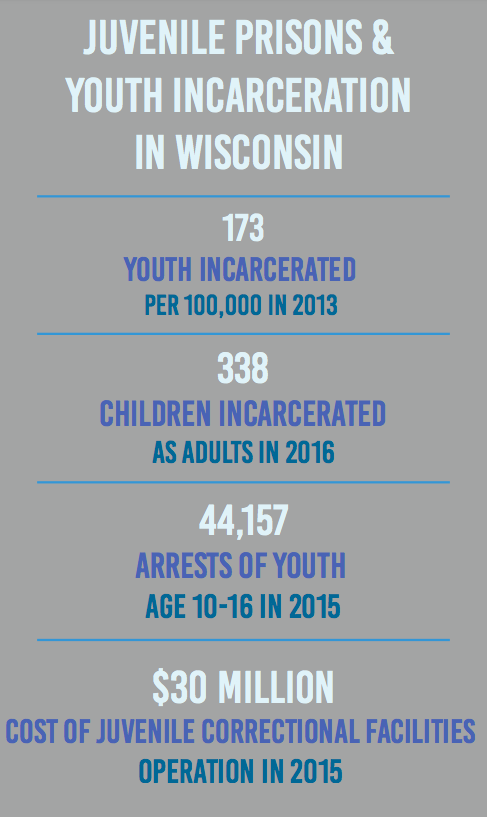Last year, the state legislature unanimously passed Act 185, a bill to dramatically reorganize Wisconsin’s juvenile correctional system and close two of its existing youth prisons, Copper Lakes School for Girls and Lincoln Hills School for Boys, by 2021.
For years, the prisons have hosted a cycle of abuse — sexual assault and harassment, child neglect, abuse of prisoners, strangulation and suffocation — that went unreported to law enforcement and the parents of prisoners. Since 2014, the prisons have been under internal or criminal investigations by state agencies, the state and federal Departments of Justice and the FBI, all of which found evidence of prisoner and prison worker abuse and systematic attempts to cover up the abuse.
Gov. Tony Evers’ proposed budget delays closing them within two years and includes allocations for more staff at the prisons, decisions which he hopes will ensure the new juvenile prisons and rehabilitation centers are properly staffed and equipped to meet inmates’ needs. But this decision leaves children behind in Wisconsin’s most notably abusive prison.
Slavery is still legal in Wisconsin’s prisons — it’s time to change that
When a Lincoln Hills guard trained other guards to use excessive force on inmates, when the prison’s chief psychologist mocked an inmate’s naked body, when multiple inmates attempted suicide in the same month, when a teenage inmates toes were amputated after a guard slammed his foot in a door, when inmates were sexually assaulted by staff and by other inmates — no one was held criminally responsible. Now that the governor has the opportunity to embrace a new juvenile justice system, he must do it as soon as possible.
In January 2018, The Badger Herald reported reducing Wisconsin’s prison population requires that rehabilitation is the goal of juvenile justice. Youth Justice Milwaukee advocates for this approach, and has shown how involving community stakeholders and investing in community-based organizations and treatment facilities can increase accountability and reduce racial and ethnic disparities in juvenile justice.
Much like its adult prison system, Wisconsin’s juvenile incarceration rates show devastating racial disparities. Of the 173 per 100,000 youth the state incarcerates, 147 are children or teenagers of color, the fifth highest disparity in the country.
![]()



Cait Gibbons/The Badger Herald
The Wisconsin juvenile correctional system, run by the Departments of Corrections and Health and Human Services, has two designations for young people under its control. “Type 1” refers to young people locked in prisons, like Lincoln Hills and Copper Lakes, while “Type 2” designates youth in a similar legal status to Type 1 prisoners but who aren’t imprisoned themselves.
Act 185 requires the Department of Corrections open at least one new Type 1 prison for serious offenders and children convicted as adults and convert Copper Lakes and Lincoln Hills into adult prisons. For non-serious offenders, the act establishes a new class of county and tribal-run secure residential care centers. The other existing Type 1 prison, the Mendota Juvenile Treatment Center, will roughly double its size.
If the state’s goal is to emphasize rehabilitation in juvenile justice, it isn’t clear this is the way. While the transition to residential care centers may shift some juvenile offenders out of prisons, it isn’t clear how the centers would differ from prisons or if they will truly emphasize rehabilitation. Neither does the legislation clearly address Wisconsin’s juvenile recidivism rates — 63 percent for Lincoln Hills Schools and 71 percent for MJTC.
Walker stays loyal to party platform, despite criticism from former cabinet members
Clearly, closing Copper Lakes and Lincoln Hills by 2021 won’t make Wisconsin’s juvenile justice system moral. It won’t get rid of our collective impulse to punish society’s most impoverished and traumatized people — even when those people are children. It won’t do anything to close racial disparities in Wisconsin’s juvenile prison population or force us to confront the white supremacism that gave rise to the issue. It may not even leave Wisconsin with fewer juvenile prisons.
But closing the prisons without delay will end one especially cruel incarnation of prison violence. It would show this administration prioritizes kids who are traumatized by the prison system it is responsible for.
And it would be action — not silence or procrastination — against the state’s abuse of prison workers, teachers and children.
Sam Ropa ([email protected]) is a senior majoring in geography and anthropology.





















